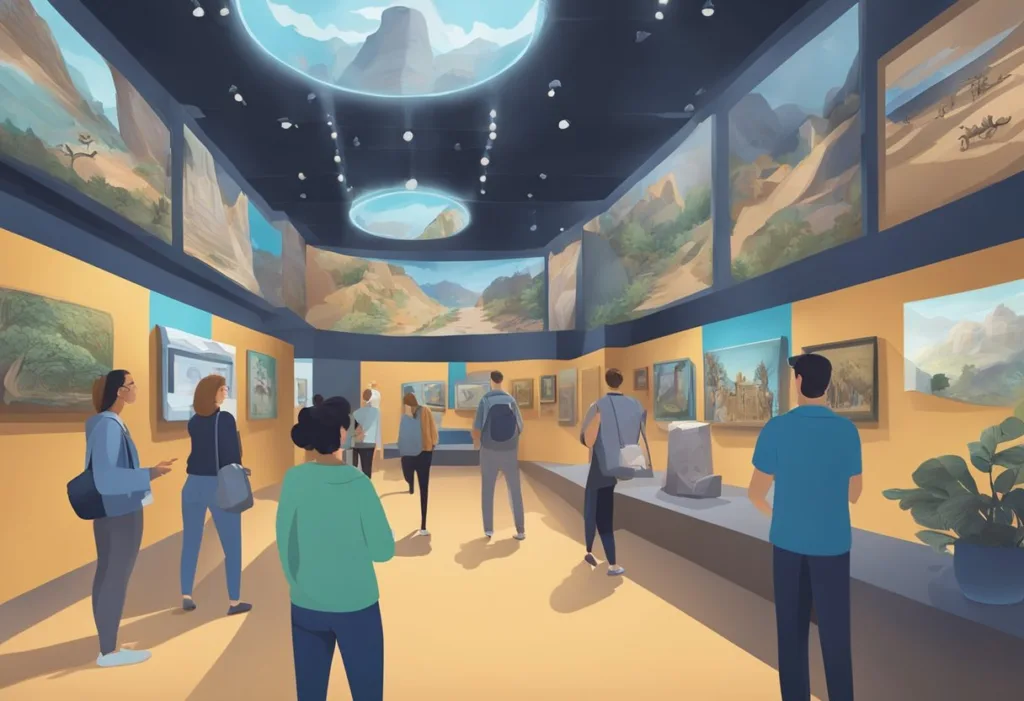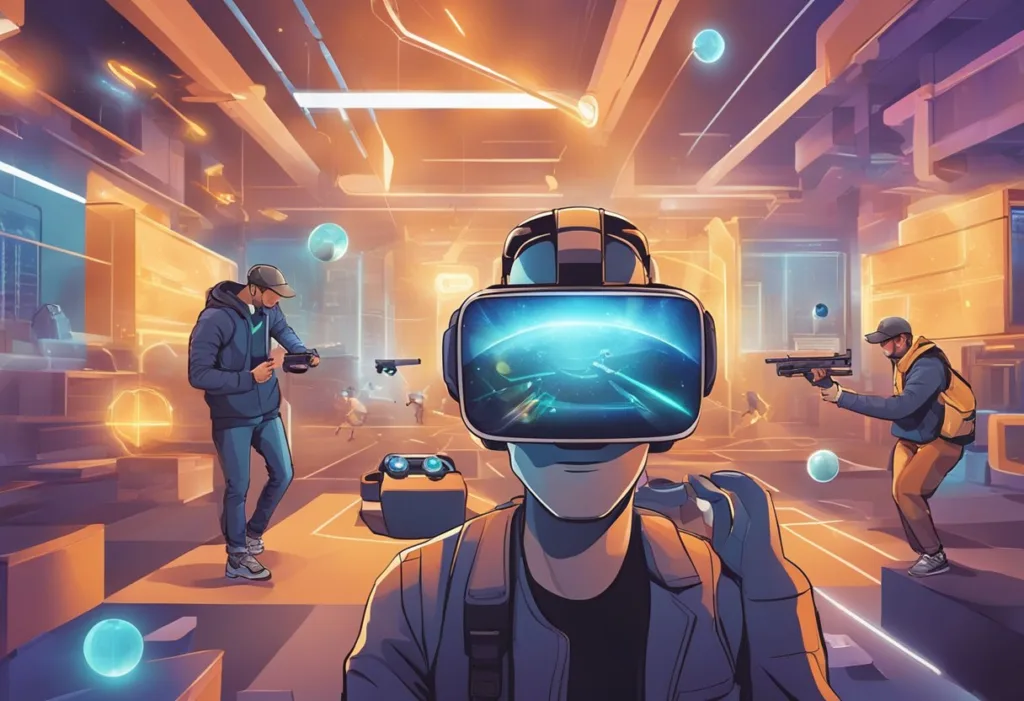Metaverse property is a relatively new concept that is gaining a lot of attention in the tech world. It refers to virtual real estate that exists within a metaverse, which is essentially a shared virtual space where users can interact with each other and the environment. In a metaverse, users can own and develop their own virtual properties, which can range from simple plots of land to entire virtual cities.
Metaverse property is becoming increasingly popular due to the rise of virtual reality and blockchain technology. As more people spend time in virtual worlds, the demand for virtual real estate is increasing. Blockchain technology allows for secure ownership and transfer of virtual assets, making it possible to buy and sell virtual properties just like physical properties.
While metaverse property is still a relatively new concept, it has the potential to become a major industry in the future. As technology continues to advance and more people spend time in virtual worlds, the demand for virtual real estate is likely to increase. This could lead to new opportunities for developers, investors, and users alike.
How metaverse properties work
Metaverse property is virtual real estate that exists within a metaverse. It is a digital asset that can be bought, sold, and traded like physical real estate.
Metaverse properties are unique in that they are entirely virtual, meaning that they exist only in a digital space. Ownership of a metaverse property grants the owner certain rights within the metaverse, such as the ability to build on the property, collect rent, and even sell the property to another user.
To own a metaverse property, users must purchase it with cryptocurrency, which is the primary form of currency used within the metaverse. In most cases, users will need to create an account within the metaverse and purchase cryptocurrency through a third-party exchange before they can buy a property.
Metaverse property prices
The price of metaverse properties varies widely depending on the metaverse and the specific location within the metaverse. Some properties are worth millions of dollars, while others may be purchased for just a few hundred dollars. The value of a property is determined by a variety of factors, including its location, size, and the demand for properties within that particular metaverse.
It is important to note that the value of metaverse properties can be highly volatile, much like cryptocurrency itself. Prices can fluctuate rapidly, and there is no guarantee that a property will increase in value over time.
Best place to buy metaverse property
The best place to buy metaverse property depends on the user’s specific needs and goals. Some of the most popular metaverses for buying and selling property include Decentraland, The Sandbox, and Somnium Space. Each of these platforms has its own unique features and benefits, and users should carefully research each platform before deciding where to invest their money.
Users should be aware of the risks associated with buying and selling metaverse properties. The lack of regulation within the metaverse means that there is no legal recourse for users who are scammed or defrauded. Users should exercise caution and only invest what they can afford to lose.
How to Buy a Metaverse Property
Buying metaverse property can be a lucrative investment opportunity for those who are interested in the virtual world. Here are the steps to follow when buying metaverse property:
Step 1: Choose a Metaverse Platform
The first step to buying metaverse property is to choose a metaverse platform. There are several metaverse platforms available, including Decentraland, Somnium Space, and The Sandbox. Each platform has its own unique features and benefits, so it’s important to research each platform and choose the one that best fits your needs.
Step 2: Purchase Cryptocurrency
Once you have chosen a metaverse platform, the next step is to purchase cryptocurrency. Most metaverse platforms require users to purchase cryptocurrency in order to buy property within the platform. Bitcoin and Ethereum are the most commonly accepted cryptocurrencies for purchasing metaverse property.
Step 3: Find a Property
After purchasing cryptocurrency, the next step is to find a property within the chosen metaverse platform. Most metaverse platforms have a marketplace where users can browse and purchase available properties. It’s important to research the available properties and choose one that fits your budget and investment goals.
Step 4: Make an Offer
Once you have found a property that you are interested in, the next step is to make an offer. In most cases, properties within metaverse platforms are sold through auctions or direct sales. It’s important to carefully consider the value of the property and make an offer that is in line with its market value.
Step 5: Complete the Purchase
If your offer is accepted, the final step is to complete the purchase. This typically involves transferring the agreed-upon amount of cryptocurrency to the seller and receiving the property’s digital asset in return. It’s important to ensure that all transactions are completed securely and that all parties involved are satisfied with the transaction.
Buying metaverse property can be a complex process, but by following these steps and conducting thorough research, investors can take advantage of the growing virtual real estate market.
Metaverse Real Estate Market
Virtual Land Ownership
Metaverse real estate is virtual real estate that is owned in the metaverse. It is a digital asset that can be bought, sold, and traded just like physical real estate. The concept of virtual land ownership has gained popularity in recent years, with investors and businesses alike seeking to invest in this emerging market.
One of the most popular virtual land platforms is Decentraland. It is built on the Ethereum blockchain and enables users to buy and sell virtual land using cryptocurrency. The Sandbox is another popular platform for virtual land ownership. It allows users to own and build on virtual land using SAND tokens.
Metaverse Property Platforms
Metaverse property platforms are online marketplaces where individuals and businesses can buy and sell virtual real estate. These platforms provide a secure and transparent environment for transactions to take place. OpenSea is one such platform that allows users to buy and sell NFTs, including virtual real estate.
The Metaverse Group is another company that offers virtual real estate services. It recently sold a 50% stake in itself for about $1.7 million. The company specializes in creating virtual real estate experiences for businesses and individuals.
Market Dynamics
The metaverse real estate market is expected to grow significantly in the coming years. According to NonFungible.com, the total value of NFT sales in the first half of 2021 was $2.5 billion, with virtual land sales accounting for a significant portion of that. The market is driven by the increasing popularity of virtual reality and the growing interest in cryptocurrencies.
Investors and businesses are increasingly looking to invest in virtual real estate as a way to diversify their portfolios and tap into this emerging market. As the metaverse continues to grow and evolve, the demand for virtual real estate is expected to increase, creating new opportunities for investors and businesses alike.
The metaverse real estate market is an emerging market that is gaining popularity among investors and businesses. Virtual land ownership and metaverse property platforms are providing new opportunities for individuals and businesses to invest in digital assets and diversify their portfolios. As the market continues to grow, it is expected to create new opportunities for investors and businesses alike.
Investment in Metaverse Property
Investing in metaverse property has become an increasingly popular choice for those interested in the next big thing. As the world of entertainment and gaming continues to evolve, the metaverse is quickly becoming the next frontier. With companies like Roblox and Atari investing in the metaverse, it’s clear that this is an area with a lot of potential.
Virtual property in the metaverse is highly speculative, but it can also be a lucrative investment. Interest in metaverse property has been growing rapidly, with investors like Grayscale putting millions of dollars into the space.
Risks and Considerations
It’s important to note that investing in metaverse property is also highly speculative and comes with a lot of risks. The market is still relatively new and untested, and it’s difficult to predict how it will develop in the future.
One of the biggest risks of investing in metaverse property is that it’s a highly speculative market. The value of virtual property can fluctuate wildly, and there’s no guarantee that it will continue to appreciate in value.
Another consideration is that the metaverse is still in its early stages, and there’s no guarantee that it will become a mainstream phenomenon. While interest in the metaverse is growing, it’s still a niche market, and it’s possible that it could remain that way.
Success Stories
Despite the risks, there have been some success stories in the world of metaverse property. Superstars like Snoop Dogg have invested in virtual property, and global businesses like PwC, JP Morgan, HSBC, and Samsung have also made moves in the space.
One notable success story is the Miami-based venture capitalist and a group of associates calling themselves the MetaCollective DAO. They used a virtual real estate broker to buy 23 parcels in The Sandbox, a user-generated content platform.
Investing in metaverse property can be a highly speculative and risky endeavor, but it can also be a lucrative one. As the world of entertainment and gaming continues to evolve, the metaverse is quickly becoming the next frontier. Investors should carefully consider the risks and potential rewards before making any investments in this space.
The Role of NFTs and Cryptocurrencies
Non-Fungible Tokens (NFTs) play an important role in the property transactions within the Metaverse. NFTs are unique digital assets that are stored on a blockchain, making them tamper-proof and secure. They can represent anything from virtual real estate to digital art, and they allow for the creation of a digital economy in which these assets can be bought, sold, and traded as if they were physical assets.
In the Metaverse, NFTs are used to represent ownership of virtual land and other digital assets. For example, Decentraland and The Sandbox, two popular Metaverse platforms, use NFTs to represent virtual land ownership. These NFTs are used to buy, sell, and trade virtual land, and they allow for the creation of a decentralized economy where users can own and control their digital assets.
Cryptocurrencies and Market Transactions
Cryptocurrencies also play an important role in the Metaverse economy. Cryptocurrencies such as Ethereum, MANA, and SAND are used as the primary means of exchange within the Metaverse. These cryptocurrencies are used to buy, sell, and trade virtual assets, and they allow for a decentralized economy where users can transact without the need for intermediaries.
Cryptocurrencies also allow for a more efficient and secure market transaction within the Metaverse. Users can use a digital wallet such as MetaMask to store their cryptocurrencies and use them to buy and sell virtual assets. These transactions are recorded on a blockchain, making them tamper-proof and secure.
NFTs and cryptocurrencies play a crucial role in the Metaverse economy. NFTs allow for the representation of digital assets, while cryptocurrencies provide a means of exchange within the Metaverse. Together, they create a decentralized economy where users can own and control their digital assets without the need for intermediaries.
Social and Cultural Impact
The emergence of the metaverse has significant social and cultural implications. Virtual communities and networking, digital identity and expression, and the future of virtual interaction are some of the areas that will be impacted.
Virtual Communities and Networking
The metaverse will allow individuals to socialize and network in virtual worlds. Avatars will be able to interact with each other, creating new forms of social interaction. Virtual gaming will also be transformed, with players able to interact with others in a more immersive way. This could lead to the development of new forms of entertainment and virtual property.
Digital Identity and Expression
The metaverse will allow individuals to create and express their digital identity in new ways. Avatars will be able to represent individuals in virtual worlds, allowing for greater expression and creativity. The development of virtual property and metaverse property will also allow individuals to own and express themselves in new ways.
Future of Virtual Interaction
The metaverse has the potential to revolutionize the way people interact with each other. Architects and designers will be able to create virtual worlds that are more immersive and interactive. Entertainment and gaming will also be transformed, with new forms of virtual property and social interaction.
Companies such as Facebook and Microsoft are already investing heavily in the development of the metaverse, and Forbes Business Council predicts that the metaverse will become a key driver of the global economy in the coming decades.
The metaverse has the potential to transform social and cultural norms, creating new forms of virtual interaction and expression. As the metaverse continues to develop, it will be interesting to see how it impacts society and culture.
Frequently Asked Questions
What factors determine the price of virtual real estate in 2023?
The price of virtual real estate in the metaverse is determined by several factors. These include the location of the property, the size of the land, the popularity of the platform, and the demand for virtual real estate. The value of virtual real estate is influenced by the supply of land, the level of competition among buyers, and the overall economic conditions of the metaverse.
What are the benefits of owning land in the metaverse?
Owning land in the metaverse can provide several benefits. First, it allows people to establish a virtual presence and interact with others in the metaverse. Second, it provides a platform for people to showcase their creativity and build their own virtual environments.
Third, it provides an investment opportunity for people to earn money by renting out their virtual property or selling it for a profit. Finally, it allows people to participate in the growth of the metaverse and shape its development.
How can one become a metaverse real estate agent?
To become a metaverse real estate agent, one needs to have a good understanding of the metaverse and its virtual real estate market.
One needs to have a background in real estate or a related field, such as architecture or urban planning. One can also gain experience by working for a company that specializes in metaverse real estate or by networking with other professionals in the field.
What are the top platforms for purchasing metaverse property?
The top platforms for purchasing metaverse property include Decentraland, The Sandbox, Somnium Space, and CryptoVoxels. Each platform has its own unique features and benefits, and people should research each platform carefully before making a purchase.
How can investors assess the value of metaverse land?
Investors can assess the value of metaverse land by considering several factors. These include the location and size of the property, the popularity of the platform, the level of competition among buyers, and the overall economic conditions of the metaverse. Investors should consider the potential for future growth and development of the platform and the overall demand for virtual real estate.
What are the latest trends in metaverse real estate development?
The latest trends in metaverse real estate development include the integration of blockchain technology, the use of virtual reality and augmented reality, and the creation of immersive and interactive virtual environments. There is a growing interest in sustainable and eco-friendly virtual real estate development, as well as the creation of virtual real estate that serves a social or community purpose.














